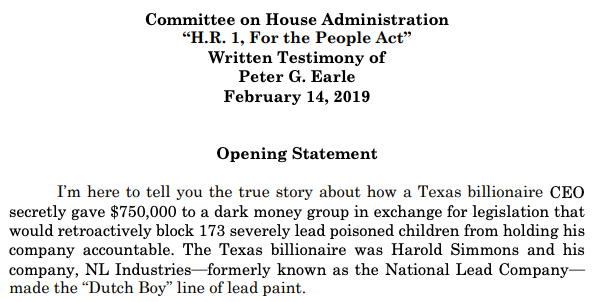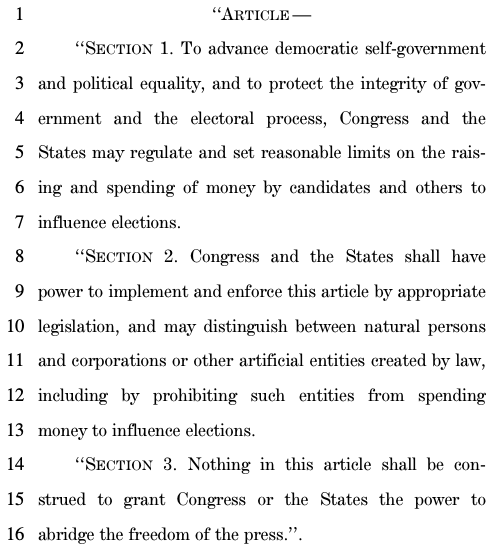Today is the 11th anniversary of Citizens United, the SCOTUS decision that ushered in the era of super PACs, dark money, & megadonors.
But there are solutions. Here are some of the #HR1 reforms that address the impact of CU and protect the voices of voters in our democracy.
But there are solutions. Here are some of the #HR1 reforms that address the impact of CU and protect the voices of voters in our democracy.
First, ending dark money. Citizens United opened the door to unlimited spending by corporations, including nonprofits that hide their donors. Thanks to CU, in the 2020 cycle, $750M was spent by secretly-funded “dark money” groups (most of it by Democrats). https://www.opensecrets.org/news/2020/10/dark-money-2020-new-ways-to-hide-donors/
When donors remain secret, the public might never know whether politicians later take action to advance those donors’ interests.
As an example of the problems with dark money, take a look at Wisconsin: https://www.wiscontext.org/how-dark-money-almost-derailed-wisconsin-lead-poisoning-lawsuit
As an example of the problems with dark money, take a look at Wisconsin: https://www.wiscontext.org/how-dark-money-almost-derailed-wisconsin-lead-poisoning-lawsuit
A CEO gave Scott Walker's dark money group $750K, and Walker signed a bill immunizing the CEO's company against lawsuits from lead poisoned children. https://www.congress.gov/116/meeting/house/108899/witnesses/HHRG-116-HA00-Wstate-EarleP-20190214.pdf
Citizens United actually endorsed donor disclosure as a means of tracking and deterring corruption. The problem is that transparency laws have not been updated post-Citizens United, and the FEC has not enforced the laws on the books.
#HR1 would make the transparency predicted by Citizens United a reality. It closes dark money loopholes and requires disclosure when wealthy donors give $10K or more to groups that spend money on elections.
Second, HR1 addresses super PACs. Citizens United opened the door for super PACs to raise and spend unlimited amounts on the condition that they are INDEPENDENT of the candidates they support.
But in practice, many super PACs are effectively extensions of a candidate's campaign.
But in practice, many super PACs are effectively extensions of a candidate's campaign.
Like, there are the super PACs created or financed by the candidate's family members https://www.politico.com/story/2012/07/super-pacs-keep-it-in-the-family-078931 https://www.thedailybeast.com/well-off-families-are-funding-super-pacs-to-hyper-boost-their-relatives-congressional-campaign
There are super PACs set up by the candidate's former aides https://www.latimes.com/politics/la-xpm-2011-apr-29-la-pn-obama-fundraising-committee-20110429-story.html
There are super PACs that hire the same fundraisers as the candidates the PAC supports https://campaignlegal.org/update/disclosures-shed-light-relationship-between-votevets-and-buttigieg-campaign
And there are the candidates who appear personally at super PAC fundraisers, and offer privileged access to the PAC's six-figure donors. https://slate.com/news-and-politics/2020/01/citizens-united-john-roberts-trump-impeachment.html
When a donor gives $1M to a super PAC working closely with a candidate, its almost as if they gave $1M directly to the candidate. That’s a recipe for corruption.
HR1 attacks these problems with “the Stopping Super PAC-Candidate Coordination Act."
HR1 attacks these problems with “the Stopping Super PAC-Candidate Coordination Act."
Under HR1, if a candidate fundraises for a super PAC, or if the PAC is formed by the candidate or her aides, or uses the same vendors as the candidate, the super PAC can’t spend unlimited amounts supporting that candidate.
Third, #HR1 fixes the agency in charge of enforcing campaign finance law, the FEC.
The FEC gets little attention, but it is responsible for many of the post-Citizens United problems with our campaign finance system.
The FEC gets little attention, but it is responsible for many of the post-Citizens United problems with our campaign finance system.
For example, the FEC failed to adopt new disclosure or coordination rules in the wake of Citizens United, and refused to enforce the rules on the books.
In fact, the FEC has NEVER fined a super PAC for coordinating with a candidate.
In fact, the FEC has NEVER fined a super PAC for coordinating with a candidate.
And 11 years after Citizens United made super PACs a central feature of U.S. elections, FEC rules still have not been updated to even acknowledge the EXISTENCE of super PACs.
The FEC needs fixing. https://campaignlegal.org/sites/default/files/2020-01/CLC%20FEC%20Solutions%20One-Pager.pdf
The FEC needs fixing. https://campaignlegal.org/sites/default/files/2020-01/CLC%20FEC%20Solutions%20One-Pager.pdf
#HR1 draws from the bipartisan “Restoring Integrity to America’s Elections Act” to restructure the FEC so that it can function as an effective watchdog.
Fixing the FEC is a crucial component of reform, because new laws mean little if they aren't enforced.
Fixing the FEC is a crucial component of reform, because new laws mean little if they aren't enforced.
Fourth, HR1 creates a small dollar matching program—because the most effective way to counter the influence of a tiny number of big donors is to amplify the impact of a large number of small donors.
HR1 offers a 6-to-1 match on small-dollar contributions up to $200. A $20 donation, for example, is matched with $120, for a total donation of $140.
And the program is financed by fines on corporate execs rather than taxpayer funds. https://www.brennancenter.org/sites/default/files/analysis/Understanding%20HR1%20Public%20Financing.pdf
And the program is financed by fines on corporate execs rather than taxpayer funds. https://www.brennancenter.org/sites/default/files/analysis/Understanding%20HR1%20Public%20Financing.pdf
Public financing broadens the donor base beyond a wealthy white male elite. It opens doors for candidates of all backgrounds to compete. And it makes officeholders responsive to the community members funding their campaigns, rather than a handful of wealthy special interests.
Read this for more on how public financing advances race and gender equity in Congress: https://www.brennancenter.org/our-work/research-reports/small-donor-public-financing-could-advance-race-and-gender-equity
Those are just a few of the many post-Citizens United campaign finance reforms in #HR1. The bill also strengthens digital transparency, strengthens protections against foreign interference, delivers on CU's “shareholder democracy” promise, and more.
But addressing Citizens United alone won't restore our democracy.
That's because big money in politics & voter suppression are two sides of the same coin: both function to diminish the voices of ordinary people and maximize the influence of an unrepresentative wealthy elite.
That's because big money in politics & voter suppression are two sides of the same coin: both function to diminish the voices of ordinary people and maximize the influence of an unrepresentative wealthy elite.
...and that’s why #HR1 addresses voter suppression and gerrymandering as well as dark money and unlimited corporate cash, together, as a comprehensive democracy reform package.
Read more about some of HR1’s key provisions here:
https://campaignlegal.org/sites/default/files/2020-01/01-17-20%20Post-CU%20Solutions%20Formatted%20155pm.pdf
Read more about some of HR1’s key provisions here:
https://campaignlegal.org/sites/default/files/2020-01/01-17-20%20Post-CU%20Solutions%20Formatted%20155pm.pdf
 Congress need not stop there: it could also amend the constitution to overturn Citizens United. But until an amendment is ratified, there's a lot that Congress can do to address the ongoing fallout from Citizens United. https://www.govinfo.gov/content/pkg/BILLS-117hjres1ih/pdf/BILLS-117hjres1ih.pdf
Congress need not stop there: it could also amend the constitution to overturn Citizens United. But until an amendment is ratified, there's a lot that Congress can do to address the ongoing fallout from Citizens United. https://www.govinfo.gov/content/pkg/BILLS-117hjres1ih/pdf/BILLS-117hjres1ih.pdf

 Read on Twitter
Read on Twitter




